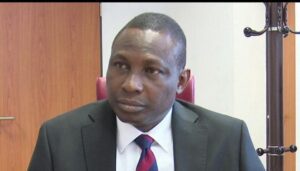
Boosting your career with effective public speaking and presentation skills (3)
By Goke Ilesanmi
Last week, we said to acquire the required proficiency in public speaking and presentations generally, you must be sincere to yourself by doing the necessary self-auditing for accurate self-awareness and then personal development or learning.
We added that self-awareness is about having a clear perception of your personality, including strengths, weaknesses, thoughts, beliefs, motivation and emotions.
We explained that you need to be conscious of your physical, intellectual, psychological and social peculiarities to succeed.
We said as regards personal development, this is a conscious effort by an individual to train and discipline himself or herself after being aware of his or her strengths and weaknesses through self-auditing.
We added if you know you are an introvert, you need to face reality by going for a standard professional speaking and presentation training programme and embark on constant practice for continuous improvement.
We said even untrained extroverts who are naturally confident to speak in public need to undergo professional training too so as to perfect their speaking and presentation skills and leave the realm of amateurish confident speakers.
We said it is impressive that some visionary people normally embark on personal development after having done self-auditing, and are aware of areas that need to be developed.
We added that it is a pity that most people are aware of their introversion or deficiency in public speaking and presentation skills without taking any remedial action.
We said most of such introverts will wait till when they encounter embarrassment in official events such as promotion interviews or business presentations before they finally take action.
Political office-holders
As a politician, for instance, you need to master the art of effective public speaking and persuasive communication to succeed because you must be able to convince the electorate and even win opposition over during electoral campaigns so that they can vote for you.
Research shows that the fear of speaking in public is more than that of death. Yes. For instance, it is not all the people that are ready to join the security forces, despite the risk of unexpected death, that are bold enough or ready to speak in public. Yet, speaking effectively in public or making business presentations is inevitable if we must succeed in our business or career. Many people have got retarded career or business growth just because they are afraid to speak in public or make oral business presentations that should have accorded them opportunity to market/sell themselves.
Gaining self-confidence and courage as well as the ability to think calmly and clearly while making a presentation is not one-tenth as difficult as most people imagine. There is no reason why you should not be able to think as well in a perpendicular position before your audience as you do when sitting down. In other words, you need to train your brain to think better even when facing an audience. You should not allow their presence to frighten you, rather let it be your source of motivation or inspiration.
Brilliant speakers
The fact is that many great public speakers often claim that their brains become more functional whenever they stand before an audience. You can also become an expert too if you are determined to get over your fear through constant practice and training. Do not imagine that your case is unusually difficult. Even those who afterward became the most eloquent representatives of their generation were, at the outset of their careers, afflicted by this blinding fear and self-consciousness.
Revelations
In the words of Lloyd George, a renowned public speaker, “The first time I attempted to make a public talk, I tell you I was in a state of misery. It is no figure of speech, but literally true, that my tongue clove to the roof of my mouth; and, at first, I could hardly get out a word.”
In a related development, Jean Jaures that was the most eloquent political speaker produced by France in his generation sat for a year, tongue-tied in the Chamber of Deputies before he could summon up the courage to make his initial speech.
Also John Bright, the great Briton who defended in England the cause of union and liberation during the civil war made his maiden speech before a group of country folk gathered in a school building, and he was so frightened on the way to the place that he told his friend to start applause to bolster him up whenever he radiated any sign of nervousness.
More than ever, people now have to present information to others as part of constant up-dating. People are being increasingly called upon to present their information publicly to co-workers and other departments. To get ahead, you have to present!
Self-management
But how often are we taught how to present? One major area of skills to presentation is self-management, the ability to remain composed in front of an audience.
Learning this skill makes a huge difference not only to the quality of your public presentation but also to your enjoyment. Truly fantastic presenters are quite a rare commodity because most people have never taken the time to learn. Being an excellent presenter will enhance your career and social life.
Process of preparing a presentation
Success in public speaking depends a lot on good preparation, which guarantees self-confidence. The following are very important steps for preparing an effective speech:
Get a topic the presentation will be based on.
Try to know whom the audience members are, e.g. age, sex, religion, educational qualifications, etc.
Determine the purpose of the presentation, whether to Inform, Educate/Entertain, Persuade or Motivate.
Gather relevant information/data through research.
Extract the most important information/data that can accurately fit into the time allotted.
Arrange the material already extracted into an outline.
Use the outline to write your first draft in your own language and ideas.
Read over/rewrite/edit your first draft severally to get your final draft.
Stages of writing
The eight-step process of speech preparation can also be discussed in a summary form tagged “three stages of writing”. The three stages of writing your material for presentation are Pre-writing, Writing and Rewriting.
Pre-writing stage: The pre-writing stage, as the name implies, is the stage of research when one has not started writing. In other words, it refers to all the efforts you make before you finally start writing your first draft. So up till the time you form an outline before writing the first draft, you are still at the pre-writing stage. At this stage, you apply some of the qualities of good writing such as consideration, completeness and correctness. (We will discuss qualities of a good speech later.) At this stage, you will also consider the space allotted or target length and then re-arrange the research material and form an outline of writing.
Writing stage: The writing stage is the second stage. Here, you will use the outline formed in the pre-writing stage to write your first draft. To achieve seamless writing at this stage, you must avoid editing, checking the dictionary or consulting any reference material for addition to your writing. This is the stage of natural flow of ideas, so do not impede the flow.
Rewriting/editing stage: The third and last stage is the rewriting/editing stage.It is at this stage that you will severally rewrite and/or edit the first draft written in the writing stage to get the finaldraft. It is also at this stage that you check the literacy level of your language and elevate it if necessary without being complex. It is equally at this stage that you will make your style creatively and distinctively simple without being common or ordinary.
The simple rule for seamless and quality speech-writing is to maintain time discipline here. That is, spend the time meant for pre-writing on pre-writing; time for writing on writing alone and time for rewriting/editing on it alone.
NOTE: Yours sincerely was inducted as a Professional Fellow of the Institute of Information Management Africa on Saturday, March 20, 2021. So the title of “FIIM” is now added to my name.
To be continued
GOKE ILESANMI (FIIM, FIMC, CMC), CEO of Gokmar Communication Consulting, is an International Platinum Columnist, Professional Public Speaker, Career Mgt Coach and Certified Mgt Consultant. He is also a Book Reviewer, Biographer and Editorial Consultant.
Tel: 08055068773; 08187499425
Email: [email protected]
Website: www.gokeilesanmi.com.ng



